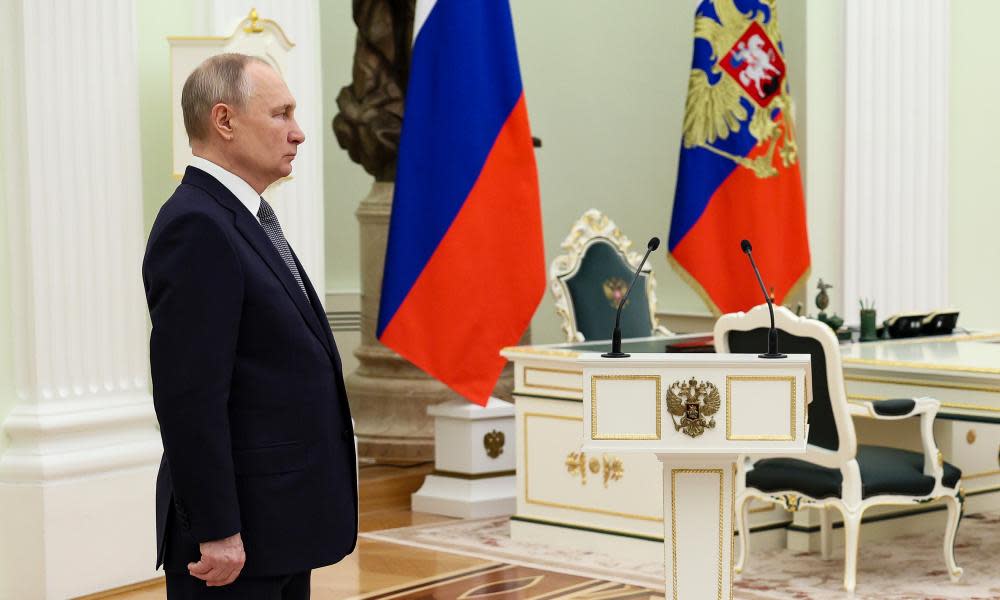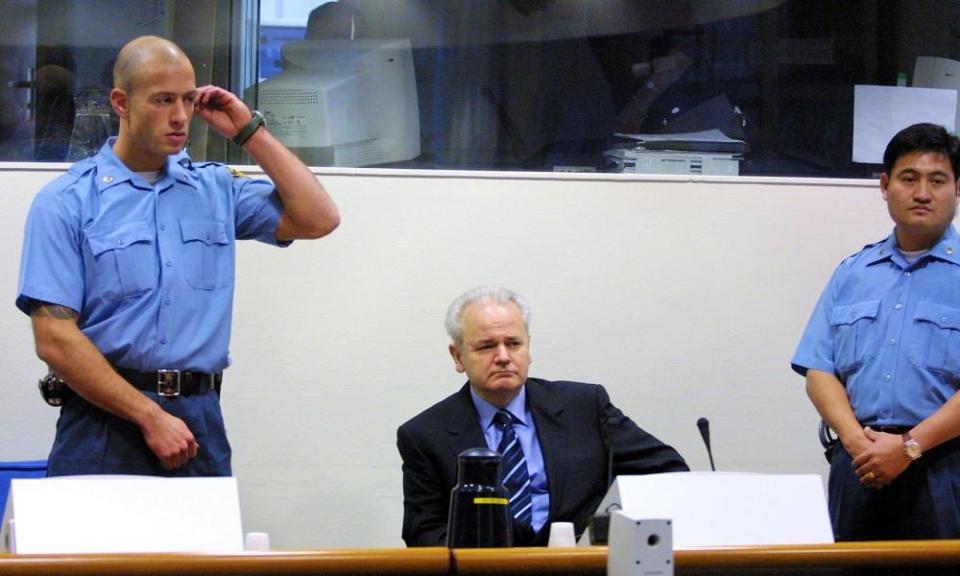Milosevic finally stood trial at The Hague – and Vladimir Putin isn’t above the law either

The announcement by the international criminal court (ICC) of an arrest warrant for Vladimir Putin is historically significant. In some ways, it was always inevitable: this is Putin’s illegal war of aggression, after all. But few inside or outside Ukraine believed it would happen so soon.
There are obvious questions about the practicalities of delivering Putin to the court – how, where, when? (Answers: with difficulty; who knows; and not soon.) But the essential rationale is undeniable. Holding senior political and military leaders to account is exactly what the ICC was set up for, 25 years ago. If not Putin, who?
This is the first ICC warrant to be issued in relation to the Ukraine war – with more to come, we can reasonably assume. (Most observers expect there may be up to 10 major cases in total.) The charges are narrowly framed, stating that there are “reasonable grounds” to believe that Putin and his children’s commissioner, Maria Lvova-Belova, are responsible for the deportation of children from occupied Ukraine into Russia. The court has planted its flag at the highest level, with obvious impact.
After a stunned silence, leading pro-Kremlin commentators went literally nuclear. The Russian state TV host, Vladimir Solovyov, called for an “immediate nuclear strike” on any country that might dare to arrest the Russian leader, and others made similar demands.
The bluster reflects how much the announcement caught the Kremlin off guard. An international court has branded the leader of one of the most powerful countries in the world as a war crimes suspect, with no expiry date.
That has implications, not least for the upcoming summit of Brics countries (Brazil, Russia, India, China and South Africa), to be held in South Africa in August. Any country that has ratified the ICC’s founding charter, the Rome statute, is obliged to arrest an indictee if he comes within that country’s jurisdiction. South Africa, this year’s Brics host, is a founding member of the ICC. In short: game on.
There are three scenarios of how Putin’s dilemma could play out. The first possibility: Putin might fly to South Africa and be arrested as he steps off the plane. That most dramatic outcome is improbable for obvious reasons, unless Putin has more self-destructive urges than we have seen so far.

A second possibility is that he flies in, after receiving assurances from South Africa that it will defy the ICC and leave him in peace. In 2015, the South African government ignored an order from its own courts and allowed the Sudanese leader Omar al-Bashir to leave an African Union summit, claiming afterwards that he enjoyed immunity as a head of state. Civil society groups were outraged. A South African court later ruled that the government had behaved “disgracefully”.
Eight years on, the situation is different. Putin’s visit would take place under a brighter global spotlight than Bashir’s brief attendance at the AU summit. This week, South Africa said it “knows its legal obligations”, which sounds very much as if it doesn’t want to provoke a Bashir-level drama again. The message will presumably be heard that way in the Kremlin.
Which brings us to the third and most likely outcome: Putin as a no-show. That is a safe way of ensuring he is not arrested, prosecuted or jailed for many years. It also saves South Africa from making tricky choices about its ally.
But this outcome isn’t cost free for Putin. It would not be a great look for a leader who loves always to exude an aura of power. The real reason for the stayaway would be clear to all, including millions of Russians – it would effectively be a “war crimes suspect” label stuck on Putin’s political forehead.
An indictment doesn’t necessarily lead to an early trial, of course. But circumstances change, as others have discovered, from the Bosnian Serb leader Radovan Karadžić to the Chadian dictator Hissène Habré. Bashir, when not in hospital, is now in jail. (The Sudanese government promised to hand him over to the ICC, though there is little sign of that.)
The closest parallel, for Putin and prosecutors alike, is Slobodan Milosevic, the Serb leader indicted by a war crimes tribunal in The Hague in 1999. Milosevic told his people – in an argument which Putin will perhaps echo – that the indictment was not because of his crimes but because he had stood up for his country’s dignity.
But Milosevic the indictee came to be seen as soiled goods, an obstacle to a better life. In October 2000, I stood among vast crowds in Belgrade who in two weeks forced the all-powerful president out of power. A few months later, I saw rows of box files at the Balkans war crimes tribunal with titles such as “Slobodan Milosevic: statements in support of killings”. In June 2001, two years after the original indictment, the Serb government delivered Milosevic to The Hague. He died behind bars, on trial for genocide.
Nothing in giant Russia will be as simple as that, especially in a context where the opposition has been so effectively crushed over many years. But the fate of Milosevic may give the paranoid Putin a few sleepless nights in the meantime.
In the past, the court has been criticised for double standards, alleged excessive focus on African states and problems of legitimacy. The court’s investigations are certainly lopsided, not least because of the way it has been structured – African states make up the court’s largest member bloc and they have been particularly active in bringing cases forward. The court’s writ does not usually apply if a country has not ratified the ICC’s statute (Ukraine has accepted the court’s jurisdiction, making the current case possible).
Almost two-thirds of UN member states are now members of the ICC, a good start. But conspicuous omissions include Syria, Myanmar, Ethiopia, Russia, China and the US. New possibilities are opening up, however. The importance of universal jurisdiction – making arrests anywhere in the world for the most serious crimes – continues to grow.
Last week’s announcement by the ICC is welcome, and may pave the way for much more. Justice is of overwhelming importance to Ukrainians, as polls confirm. It is also important to those who have suffered from crimes committed in conflict zones around the world.
Steve Crawshaw is the former Russia and east Europe editor at the Independent and former UK director at Human Rights Watch, and the author of the forthcoming Prosecuting the Powerful
The headline of this article was amended on 22 March 2023 because Slobodan Milosevic was not tried by the ICC, as an earlier version stated, but by the International Criminal Tribunal for the former Yugoslavia (ICTY).

 Yahoo News
Yahoo News 
